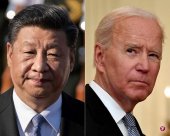(Washington Composite Electric) US National Security Consultant Sarawan said that the "one -China policy" in the United States has not changed, and "fuzzy must be one of the strategic features" on the Taiwan issue.
Sarawan Friday (July 22) Answers in the Security Forum held by Aspeng, Cycyo City, reiterated that the defense and security relations between the United States and Taiwan are still rooted in a Chinese policy, three joint communiqués, and Taiwan.Relations and six guarantees."As President Biden himself said, our policy has not changed."
He said that on the issue of Taiwan, the United States will continue to maintain a blurred policy because it is blurred by its own advantages."To some extent, the creative tension of fuzzy strategy has allowed our government to maintain peace and stability on both sides of the Taiwan Strait for decades ... ... In some specific, very complicated cases, fuzzy must be strategic features.One. In terms of concept, I defend this concept. "
Shalvin shows that the United States will continue to provide Taiwan with weapons that are more conducive to Taiwan's response to potential threats.
He said that Taiwan's potential conflicts are naval battles. What the United States has to do is to focus on providing "the most useful" weapons to Taiwan to help it develop the "pig" strategy.The media has reported that the Bayeng government tried to persuade Taiwan to adjust the military purchase case and purchase combat equipment that helps to repel China's invasion, that is, the development of "asymmetric weapons" with small and volatile.
However, the former US defense chief Esper, who has just visited Taiwan recently, said at the forum that the policy of the first American Chinese Chinese China has been outdated, and the government should abandon the vague strategy of Taiwan.
He said that the United States had not existed in the two major "letters" that the United States had adhered to the one -China policy."First, most Taiwanese now agree with themselves as Taiwanese, not Chinese. Secondly, they have given up their ambitions to return to the mainland a long time ago."
He also said that more importantly, the Chinese Communist Party has been destroying the "unwritten regulations" in the Taiwan Relations Law, that is, it is not possible to determine the final state of the cross -strait.
According to Bloomberg, representatives from Africa and Southeast Asian countries have pointed out that if the United States wants to compete with Beijing and Moscow, it must have greater responsibility for international affairs.
Kenya Ambassador to the United Nations Kimini pointed out in a group discussion on Thursday that the United States should reduce response to China, but let the world see the original power of the United States, the aggressive and competitiveness of the United States.
Kimini, for example, a Kenya minister was impressed by the local infrastructure construction, so he sought China to help build a road at the airport in the Kenya capital Nerobi.A few months later, China proposed to use the "public -private partner" model to carry out projects, and the road project was completed within a few years.
The Kenyan heads of state visited a European country at the same time and discussed a major infrastructure project, but the results were completely different."Seven years later, we still have a piece of paper. So, we appreciate China's investment. We appreciate China’ s choice for our freedom. "
African countries hope that the United States will increase the provision of substantial construction support
Kimini said that African countries want to see the United States' efforts. If the United States can provide substantial construction support, it will definitely strengthen the relationship with these countries.
Other countries represent representatives to agree with this view and hope to freely choose international investment partners on key projects.
They also regretted the pressure of "support or opposition" in the war of Russia and Ukraine.
Former Assistant Secretary of Secretary of African Affairs, the United States, frankly said on the forum that developing countries "do not want to be a pawn on a chessboard in a global country."
She said: "The point of these countries is to let us choose the country we want to cooperate. For example, we decided to cooperate with China on the Belt and Road Initiative, which does not mean that we don't want to cooperate with the United States."



